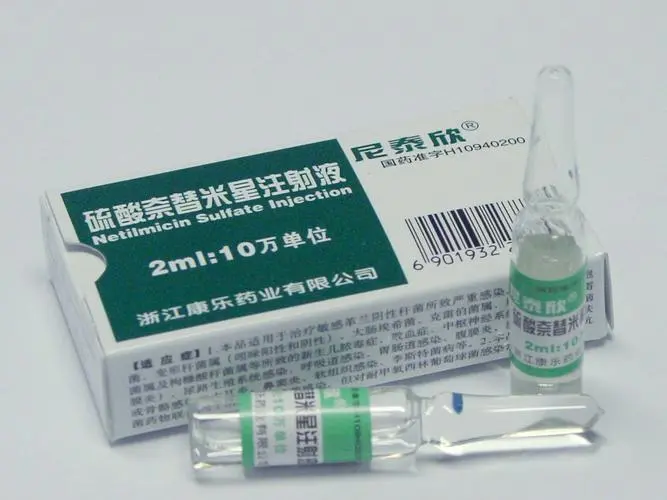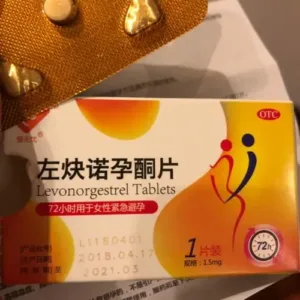NETILMICIN SULFATE INJECTION
Effects and efficacy: This product has a wide range of antimicrobial effects, mainly targeting Gram-negative rods and a few Gram-positive bacteria, including Citrobacter, Enterobacter, Escherichia coli, Klebsiella, Proteus Morgan, Pseudomonas aeruginosa, Salmonella, Shigella and Staphylococcus (penicillin- and methicillin-resistant). These infectious diseases include: complicated urinary tract infection. Sepsis. Skin and soft tissue infection. Intraperitoneal infection, including peritonitis and intra-abdominal abscess. Lower respiratory tract infection. Usage and dosage: This product can be injected intramuscularly or intravenously. The dosage for intramuscular injection and intravenous drip is the same. This product can be added to 50-200ml of 5% glucose injection or 0.9% sodium chloride injection for intravenous drip, and the drip time is 1.5-2.0 hours each time. In order to correctly calculate the dosage, the patient’s weight should be known before administration. For obese patients, the dosage should be calculated according to the standard weight. Renal function can be estimated based on the determination of serum creatinine concentration or calculated based on intrinsic creatinine clearance. In addition, renal function should be checked regularly during treatment. For patients with excessive burns on the body surface, their serum drug concentration may decrease due to changes in pharmacokinetic parameters, and it is more important to guide the dosage by measuring serum drug concentration. The course of medication should be as short as possible while ensuring efficacy. The usual course of treatment is 7-14 days. In the case of concurrent infection, a longer treatment time may be required. Although netilmicin is well tolerated with extended treatment time, renal function, hearing and vestibular function should be tested for long-term administration. If there are clinical abnormal indications, the dose should be adjusted appropriately. During the application process, the peak and trough values of serum drug concentrations should be measured to ensure effectiveness and safety at the given dose. When the measurement method is feasible, the peak concentration range is 4-12μg/ml and cannot exceed 16μg/ml. Due to differences in renal function (normal or abnormal) between individuals, the drug concentration will vary. The peak concentration should be controlled at 6-12μg/ml, and the trough concentration should be preferably 0.5-2μg/ml. For the effectiveness of serum drug concentrations in special patients, the sensitivity of pathogens, the severity of infection, and the function of the patient’s immune defense system should be considered. The recommended dose is not fixed and is only a guide for selecting doses during the first treatment or when blood drug concentrations cannot be measured during treatment. The dose for patients with normal renal function is 1.5-2.0mg/kg/time, once every 12 hours for complicated urinary tract infections in adults; 1.3-2.2mg/kg/time, once every 8 hours for severe systemic infections, or 2-3.25mg/kg/time, once every 12 hours for infants (over 6 weeks of age) to children aged 12 years: the total daily dose is 5.5-8.0mg/kg. It can be taken once every 8 hours, with a dose of 1.8-2.7 mg/kg each time; it can also be taken once every 12 hours, with a dose of 2.7-4.0 mg/kg each time. Dosage for patients with renal impairment For patients with renal impairment, the dose must be individualized to ensure effective therapeutic concentration. There are several ways to adjust the dose, but the most accurate method is to adjust based on blood drug concentration. If blood drug concentration cannot be obtained and the patient’s renal function is stable, measuring the creatinine clearance is the most reliable. For patients with varying degrees of renal impairment, the adjusted dose can be calculated according to the creatinine clearance formula “Patient dose = recommended dose for normal people × patient’s creatinine clearance / normal person’s creatinine clearance”. The adjusted total daily amount can be administered once a day (i.e., once every 24 hours) or 2-3 times a day (i.e., once every 8 hours or 12 hours). Generally speaking, a single dose cannot exceed 3.25 mg/kg. For patients with renal insufficiency who are undergoing hemodialysis, the amount of drug removed by dialysis is related to the equipment and methods used. During dialysis, it is recommended that adults supplement with 2.0 mg/kg of netilmicin until the blood concentration reaches the required concentration.
Drug contraindications:
This product is contraindicated if you are allergic to it
Related dosage forms:
Netilmicin sulfate injection
Share:
Products
Our offers
Health Classification
Let us work together to protect precious health



























